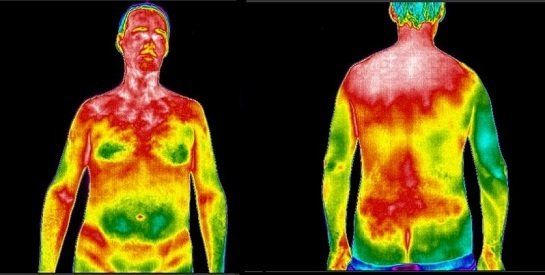Upper Body Screening
Upper Body
This thermal imaging series consists of 19 images and includes the head & neck, thyroid region, breast (chest for male), abdomen and upper & lower back. Optional testicular screening for men.
Thermography can aid in the assessment of various dysfunctions, diseases, and other concerns in the upper body to include:
- Lymphatic Congestion
- Digestive Disorders
- Kidney and Liver Dysfunction
Lymphatic Congestion
The lymphatic system plays an important role within the immune system because it removes cellular waste, toxins, bacteria and destroys old or abnormal cells, including cancer cells.
The lymphatic system consists of thin tubes known as lymphatic vessels and lymph nodes that run throughout the body. The lymphatic vessels carry a liquid called lymph. The lymph nodes filter the lymph fluid as it passes through them allowing white blood cells known as lymphocytes to attack cellular waste, toxins and bacteria within the lymph. When cancer cells “break away” from a tumor, they become stuck in one or more of the nearest lymph nodes.
Lymphatic congestion, a condition in which the lymphatic system fails to drain properly, allows for cellular waste products, toxins and bacteria to accumulate in the body. Lymphatic congestion contributes to swollen lymph nodes, chronic sinus and respiratory congestion, breast swelling, lymphatic cancers and other health problems.
Digestive Disorders
Digestive disorders are the result of inflammation and/or infection in one or more areas of the digestive system. Inflammation shows as heat (hyperthermia) over the area of concern. Ulcers, gastroesophageal reflux disease (GERD), and inflammatory bowel diseases such as diverticulitis and Crohn's disease, are a few disorders or diseases that may be detected in an upper body thermography screening.
A peptic ulcer is a sore in the lining of the stomach or duodenum, the first part of the small intestine. Peptic ulcers happen when the acids that assist in the digestion of food damage the walls of the stomach or duodenum. The most common cause is infection due a certain bacteria. Another cause is the long-term use of nonsteroidal anti-inflammatory medicines such as aspirin and ibuprofen.
Gastroesophageal reflux disease (GERD) is a common digestive disorder that affects the lower esophageal sphincter, which is the ring of muscle between the esophagus and stomach, where stomach acid persistently and regularly flows up into the esophagus. GERD occurs in people of all ages, and sometimes for unknown reasons. The most common symtom of GERD is chronic heartburn.
Kidney and Liver Dysfunction
Kidney dysfunction can affect the body’s ability to clean the blood, filter extra water out of the blood, and help control blood pressure. When the kidneys are not functioning properly, waste products and fluid can build up in the body which causes inflammation. Dysfunction in the kidneys can include kidney cysts, kidney stones and chronic kidney disease.
Schedule Your Appointment Today
Chronic kidney disease, also called chronic kidney failure, describes the gradual loss of kidney function. In the early stages of chronic kidney disease, few signs or symptoms may be present. Chronic kidney disease may not become apparent until the kidney function is significantly impaired.
The liver is the largest organ in the human body and is responsible for well over 200 functions. It is also the most resilient organ, able to withstand some of the harshest assaults by today’s mix of air pollution, environmental contaminants, pharmaceuticals, bacteria, fungi, mold, and viruses. Dysfunctions in the liver may appear as digestive problems, blood sugar problems, weakened immune system and hormonal imbalance.




